新概念英语第二册68课课后习题详细答案
新概念英语第二册课后题答案详解Lesson68

新概念英语第二册课后题答案详解Lesson681. b根据课文第3行和第7行 I never enjoy meeting Nigel Dykes. ‘Hello Nigel,’ I said. ‘Fancy meeting you here!’ .能够推测出b. out of politeness(出于礼貌)是伊丽莎白向Nigel打招呼时的态度和口气,其他3个选择都与课文的实际情况不符。
2. b根据课文的情景,能够判断b. insensitive(感觉迟钝的)能最恰当的描绘Nigel Dykes 是什么样的人,其他3个选择a. funny(可笑的,滑稽的);c. nuisance(讨厌的人),d. cruel(残酷的)都不够恰当,不符合课文的内容。
我们这道题目是让你选一个词来描绘Nigel Dykes 是什么样的人,只有他反应迟钝能够最恰当了。
他不能领会作者的意思,作者不想跟他说话,便称自己要去看牙医,很明显作者是想打发Nigel Dykes 他走,但是他硬是不明白作者的意思,还要陪作者去。
你说这样的一个人,不时反应迟钝,还是什么??? 用我们现在的话来说“他大脑有问题,积水啦,弱智啦。
”3. c只有c. running 最合乎语法,running 在此句中是现在分词做状语,表示方式。
其他3个选择都不合乎语法。
a. run 是动词原形,不能放在went 后面;b. to running 前面不应该有to; d. ran 是过去式,更不能用在went 后面,所以选c.4. d该句中的worth (值得……的)是形容词,它后面只能跟名词或动名词。
a. to do, b. do , c. done 都不是动名词,所以都不符合语法;只有d. doing 是动名词,所以选d.5. b该句需要选一个同前一句中的never has anything to do (从来无事可做)意义相同的短语。
a. has to do nothing (什么都不必做)同前一句意思不符;c. nothing has to do 和d. to do nothing has 都是语序混乱,没有意义;只有b. has nothing to do (无事可做)同never has anything to do 意义相同,所以选b.6. b该句的动词insisted(坚持)后面需要跟on+动名词或that引导的从句,其谓语一定要用should加动词原形。
逐句精讲新概念英语第二册第68课 纠缠不休

逐句精讲新概念英语第二册:第68课纠缠不休Lesson 68: Persistent新概念英语2课文内容:I crossed the street to avoid meeting him, but he saw me and came running towards me. It was no usepretending that I had not seen him, so I waved to him. I never enjoy meeting Nigel Dykes. He never has anything to do. No matter how busy you are, he always insists on coming with you. I had to think of a way of preventing him from following me around all morning."Hello, Nigel," I said. "Fancy meeting you here!""Hi, Elizabeth," Nigel answered. "I was just wondering how to spend the morning -- until I saw you. You're not busy doing anything, are you?""No, not at all," I answered. "I'm going to...""Would you mind my coming with you?" he asked, before I had finished speaking."Not at all," I lied, "but I"m going to the dentist.""Then I'll come with you," he answered. "There's always plenty to read in the waiting room!新概念英语2逐句精讲:1、I crossed the street to avoid meeting him, but he saw me and came running towards me.我穿过马路以便避开他,但他看到我并朝我跑了过来。
【新概念英语册课后题及答案:Lesson67-68】新概念英语第二册课后题答案
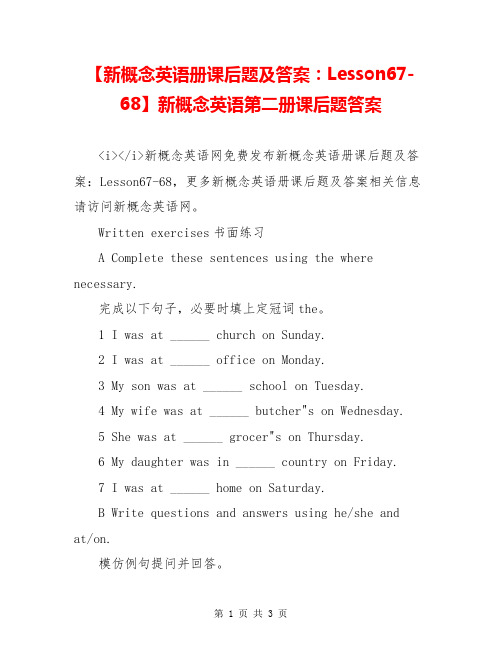
【新概念英语册课后题及答案:Lesson67-68】新概念英语第二册课后题答案<i></i>新概念英语网免费发布新概念英语册课后题及答案:Lesson67-68,更多新概念英语册课后题及答案相关信息请访问新概念英语网。
Written exercises书面练习A Complete these sentences using the where necessary.完成以下句子,必要时填上定冠词the。
1 I was at ______ church on Sunday.2 I was at ______ office on Monday.3 My son was at ______ school on Tuesday.4 My wife was at ______ butcher"s on Wednesday.5 She was at ______ grocer"s on Thursday.6 My daughter was in ______ country on Friday.7 I was at ______ home on Saturday.B Write questions and answers using he/she andat/on.模仿例句提问并回答。
Example:he/church/SundayWhen was he at church?He was at church on Sunday.1 Tom/the hairdresser"s/Thursday2 Mrs. Jones/the butcher"s/Wednesday3 he/home/Sunday4 Penny/the baker"s/Friday5 Mrs. Williams/the grocer"s/Monday6 Nicola/the office/Tuesday答案:Lesson 68A1 I was at church on Sunday.2 I was at the office on Monday.3 My son was at school on Tuesday.4 My wife was at the butcher"s on Wednesday.5 She was at the grocer"s on Thursday.6 My daughter was in the country on Friday.7 I was at home on Saturday.B1 When was Tom at the hairdresser"s? He was at the hairdresser"s on Thursday.2 When was Mrs. Jones at the butcher"s? She was at the butcher"s on Wednesday.3 When was he at home? He was at home on Sunday.4 When was Penny at the baker"s? She was at the baker"s on Friday.5 When was Mrs. Williams at the grocer"s? She was at the grocer"s on Monday.6 When was Nicola at the office? She was at the office on Tuesday.。
新概念英语第二册68课 (1)
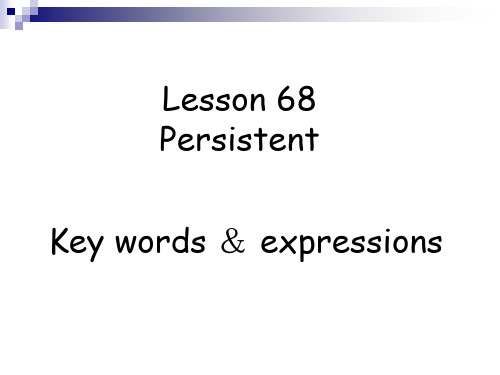
Make these short sentences into a long one, using the joining words provided.
1. There was a dentist nearby. She knew him well. Elizabeth decided to go there. She would explain what had happened. (As…whom…in order to) →as(因为) whom(引导定语从句)…in order to (目 的状语) As there was a dentist nearby whom she knew well Elizabeth decided to go there in order to explain what had happened.
His leaving is a great loss. Mother dislikes my (me) working late.
动名词复合结构多作主语或宾语, 作主语时必须是所有格(名 词所有格, 形容词性物主代词), 但作宾语时可以用所有格, 也 可用普通格(人称代词宾格)
There’s always plenty to read in the ’waiting room !
Language Points
I crossed the street to avoid meeting him, but he saw me and came running towards me.
cross vt. 穿过
▼
cross vபைடு நூலகம். through
through _________ the tunnel across __________ the river
新概念英语第二册68课

新概念英语第二册68课Lesson 66 Sweet as honey!【New words and expressions】(20)Lancaster n. 兰开斯特bomber n. 轰炸机remote adj. 偏僻的Pacific n. 太平洋damage v. 毁坏wreck n. 残骸rediscover v. 重新发现aerial adj. 航空的survey n. 调查rescue v. 营救(=save)package v. 把……打包enthusiast n. 热心人restore v. 修复(修并且复原,如对艺术品的修复)imagine v. 想像packing case 包装箱colony n. 群bee n. 蜂hive n. 蜂房preserve v. 保护beeswax n. 蜂蜡★bomber[] n. 轰炸机, 炸弹手, 轰炸员, 投弹手bomb n. 炸弹★remote adj. 偏僻的,偏远的remote village 遥远的村庄lonely adj. 偏僻的(孤零零的)lonely island 孤岛★Pacific n. 太平洋Atlantic大西洋;Indian ocean印度洋;Arctic ocean 北冰洋★wreck n. 残骸wreck强调坏了没用的东西(一个坏了的整体,完整的);wrekage强调坏成碎片的东西★rediscover v. 重新发现re-表示“再, 又”的意思,如review复习,reread再读,rewrite改写,retell复述等★survey n. 调查(一定要跟数据有关系)aerial survey 航空调查(跟数据有关系)investigation [] n. 调查,研究★package v. 把……打包①v. 把……打成大包pack n. 小包;v. 把……打成小包Pack it for me.Wrap it up for me.②n. 大包package deal 一揽子交易,一揽子交易中的条款parcel n. 包裹(邮局邮寄)★imagine v. 想像①vt. 想像Imagine it. 想象一下吧! (口语)②vt. 料想,猜想imagine doing sth. 想象……imagine that + 从句想象……I imagine you’re like to rest after your long journey.★colony n. 群, 殖民地colony [] n. 殖民地,侨民,(聚居的)一群同业,一批同行,(生物)群体a colony of ants 一群蚂蚁;a colony of bees 一群蜜蜂;a colony of artists 一群艺术家a flock of goats 羊群a herd of cows 一群奶牛a crowd of 一群(用于人)★preserve v. 保护,保存(经过特殊手段而保存下来)preserved bean curd 豆腐乳(bean curd 豆腐)preserved fruit 果脯;preserved meat 腊肉;preserved fish 腊鱼smoked fish 熏鱼keep v. 保存,保持Can I keep your photo? 我能保存你的照片吗?How long can I keep it?Can I keep it for you?Store v. 储存,保存(以便日后使用)store the cabbage【Text】In 1963 a Lancaster bomber crashed on Wallis Island, a remote place in the South Pacific, a long way west of Samoa. The plane wasn't too badly damaged, but over the years, the crash was forgotten and the wreck remained undisturbed. Then in 1989, twenty-six years after the crash, the plane was accidentally rediscovered in an aerial survey of the island. By this time, a Lancaster bomber in reasonable condition was rare and worth rescuing. The French authorities had the plane packaged and moved in parts back to France. Now a group of enthusiasts are going to have the plane restored. It has four Rolls-Royce Merlin engines, but the group will need to have only three of them rebuilt. Imagine their surprise and delight when they broke open the packing cases and found that the fourth engine was sweet as honey -- still in perfect condition. A colony of bees had turned the engine into a hive and it was totally preserved in beeswax!参考译文1963年, 一架兰开斯特轰炸机在瓦立斯岛坠毁. 那是南太平洋中一个很偏僻的小岛, 位于萨摩亚群岛以西, 距离群岛还有很长一段距离. 飞机损坏的程度并不严重, 但是, 多年来这起飞机失事已被遗忘, 飞机残骸也没受到破坏. 于是, 到了1989年, 飞机失事26年后, 在对小岛的一次航空勘查中那架飞机被意外地发现了. 到了那个时候, 状况良好的兰开斯特轰炸机实属罕见, 值得抢救. 法国政府让人把飞机包装起来, 一部分一部分地搬回法国. 一群热心人计划修复这架飞机. 该飞机装配有4台罗尔斯-罗伊斯的默林发动机, 但是他们只需要修复其中的3台. 想一想他们所感受到的惊奇和兴奋——当他们拆开包装箱时, 他们发现第4台发动机就像蜂蜜一样甜——发动机完好无损. 一群蜜蜂把发动机当作了蜂房, 发动机在蜂蜡中被完整地保存了下来.【课文讲解】1、In 1963 a Lancaster bomber crashed on Wallis Island, a remote place in the South Pacific, a long way west of Samoa.crash vi. 从上往下掉crash in the mountain 掉到山里a long way to go 有很长的路要走在英文中跟方位感相连的介词有三个in, on, toin 隶属关系Haerbin’s in the north of China.on是指跟一个地方有接触面Korea is on the north of China.to是相离的概念Japan is to the east of China.west of=to the west of (west of前面没有任何词修饰的时候,认为处于相离的概念)2、The plane wasn't too badly damaged, but over the years, the crash was forgotten and the wreck remained undisturbed.over 在……期间/之中(相当于during,over后如有数字则译为“超过”)over the years 这些年来over the new year 在新年期间;over the Christmas 在圣诞期间over Spring Festival 在春节期间He worked very hard over the last two years.remain+adj. remain看作系动词be理解The room remained warm. 房间还是那么暖和(注意与“the room was warm.”的区别, “remain”有保持的意思)3、By this time, a Lancaster bomber in reasonable condition was rare and worth rescuing.by this time 到这时in condition 处于……状态in reasonable condition=in good conditionin perfect condition 处于完美状态in poor confition 状态不好Keep the house in good condition.reasonable在这里表示“尚好的,过得去的”,用于表示价钱时,指“公道的,合理的,不贵的”等The house is in reasonable condition.The price of the dress is reasonable.be worth doing sth. 值得……,具有……的价值(表达了被动含义, 用主动ing表达被动含义)The cake is worth eating.The books are worth reading.4、The French authorities had the plane packaged and moved in parts back to France.have sth. done 让别人做某事in parts =little by little,bit by bit 一部分一部分5、Imagine their surprise and delight when they broke open the packing cases and found that the fourth engine was sweet as honey -- still in perfect condition.imagine后面可以直接加宾语Imagine my excitement when I found my mother outside.Imagine their excitement and delight when the People’s Republic of China was founded. break sth. open 打开……cut it open 剪开(信封)tear it open 撕开(信封)在固定短语中as…as中的第一个as可省略I am busy as a bee. (as busy as a bee中第一个as省略)sweet as honey 甜得象蜜(在文中是双关语, 注意体会)sticky as glue 胶水一样粘stong as horse 马一样强壮turn…into…把……变成When it is cold enough, water is turnd into ice.【Key structures】使役式使役式:have +名词/宾语代词+动词过去分词,使役式表示对某物(或某人)……。
新概念英语第二册68课
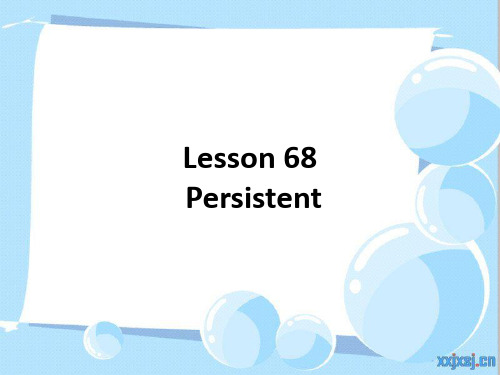
• • • • • • • • • • • •
2. 固定搭配 It’s no use doing…做某事是没用的 It’s no use crying over spilt milk. 覆水难收 It’s (not) worth doing… be busy doing 3. 动名词的逻辑主语表达方式 Would you mind opening the window? 你能开下窗子吗? Would you mind my opening the window? 你介意我打开窗子吗? Fancy her writing a letter like that. 真想不到她写了那样一封信。
• • • • • • • • • • •
★persistent adj. 1). (人、行为)不屈不挠的,执拗的,顽固的 坚持不懈的努力 persistent efforts 他追问到底 He was persistent in his question. 2). (事物)持久的,不断的,lasting 持续降雨 persistent rain 持久性污染物 persistent pollutant
• I had to think of a way of preventing him from following me around all morning. • prevent/ stop (from) doing • keep from doing • 她的突然到来使他无法出去。 • Her sudden arrival prevented him going out. • Their prompt actions prevented the fire spreading • prevention n. • Prevention is better than cure. 预防胜于治疗 • preventive adj. 预防的,防止的 • preventive measures against fire.
新概念第二册68
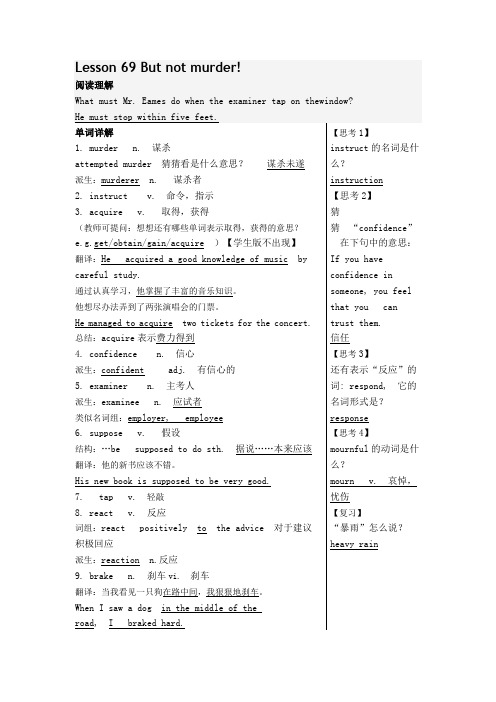
10. pedal n. 踏板(教师可以让学生看着下图,指出哪里是pedal【学生版不出现】)11. mournful adj. 悲哀的课文解析1. I was being tested for a driving licence for the third time.●∙∙词组:a driving licence 驾驶执照a business licence 营业执照●∙∙词组:for the third time 第三次翻译:这本书我已经看了三遍了,但我决定看第四遍。
I have read this book threetimes, but I decided to read it for the fourth time.2. I had been asked to drive in heavytraffic and had done so successfully.●∙∙单词:heavy adj. 大量的,多的,密集的词组:heavy traffic 拥挤的交通●∙∙用法:so代指drive in heavy traffic3. After having been instructed to drive out of town, I began to acquire confidence.●∙∙After having been instructed to drive out oftown…(详见语法重点)= After I had been instructed to drive out of town…翻译:写完超多作业后,我终于可以看会电视啦。
After having finished a lot of homework, I can watch TV now.4. Sure that I had passed, I was almost beginning to enjoy my test. The examiner must havebeen pleased withmy performance, for he smiled and said, ‘Just one more thing, Mr. Eames.●∙∙词组:be pleased with 对……满意翻译:经理对他的助手不是十分满意。
新概念英语课后练习题答案第二册:Lesson 68
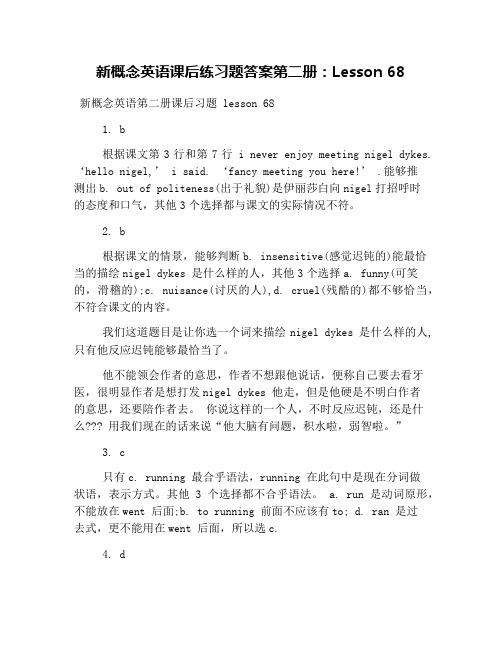
新概念英语课后练习题答案第二册:Lesson 68新概念英语第二册课后习题 lesson 681. b根据课文第3行和第7行 i never enjoy meeting nigel dykes. ‘hello nigel,’ i said. ‘fancy meeting you here!’ .能够推测出b. out of politeness(出于礼貌)是伊丽莎白向nigel打招呼时的态度和口气,其他3个选择都与课文的实际情况不符。
2. b根据课文的情景,能够判断b. insensitive(感觉迟钝的)能最恰当的描绘nigel dykes 是什么样的人,其他3个选择a. funny(可笑的,滑稽的);c. nuisance(讨厌的人),d. cruel(残酷的)都不够恰当,不符合课文的内容。
我们这道题目是让你选一个词来描绘nigel dykes 是什么样的人,只有他反应迟钝能够最恰当了。
他不能领会作者的意思,作者不想跟他说话,便称自己要去看牙医,很明显作者是想打发nigel dykes 他走,但是他硬是不明白作者的意思,还要陪作者去。
你说这样的一个人,不时反应迟钝,还是什么??? 用我们现在的话来说“他大脑有问题,积水啦,弱智啦。
”3. c只有c. running 最合乎语法,running 在此句中是现在分词做状语,表示方式。
其他3个选择都不合乎语法。
a. run 是动词原形,不能放在went 后面;b. to running 前面不应该有to; d. ran 是过去式,更不能用在went 后面,所以选c.4. d该句中的worth (值得……的)是形容词,它后面只能跟名词或动名词。
a. to do, b. do , c. done 都不是动名词,所以都不符合语法;只有d. doing 是动名词,所以选d.5. b该句需要选一个同前一句中的never has anything to do (从来无事可做)意义相同的短语。
新概念第二册Lesson68(共32页)

• 2. 固定搭配 • It’s no use doing…做某事是没用的 • It’s no use crying over spilt milk. 覆水难收 • It’s (not) worth doing… • be busy doing • 3. 动名词的逻辑主语表达方式 • Would you mind opening the window? • 你能开下窗子吗?
• dentist [‘dentɪist]
n. 牙医
• Elizabeth [i'lizəbəθ]
n. 伊莉莎白
•Why did Elizabeth cross the street ?
questions :
What does Nigel always insist on doing ?
Why did Elizabeth tell Nigel that she was going to the dentist ?
stick to 坚持不放弃愿望、原则、决定、诺言理 想. He promised to help us and he stuck to his word. 他答应帮助我们,他没有失信。 Stick to it!坚持住
keep on 继续
• 动名词的应用 • 1. 动名词做动词宾语 • avoid, enjoy, deny, fancy, admit, appreciate, complete, delay,
(1) insist on 是不及物动词用法,要接名词短语, (2) insist (that) 是及物动词用法,要接从句. 例句:
(1)John insisted on paying for lunch today. (2)John insisted that I let him pay for lunch today. (3)John insisted that he should pay for lunch today.insist 接宾语从句时
新概念英语第二册68课课后习题详细答案
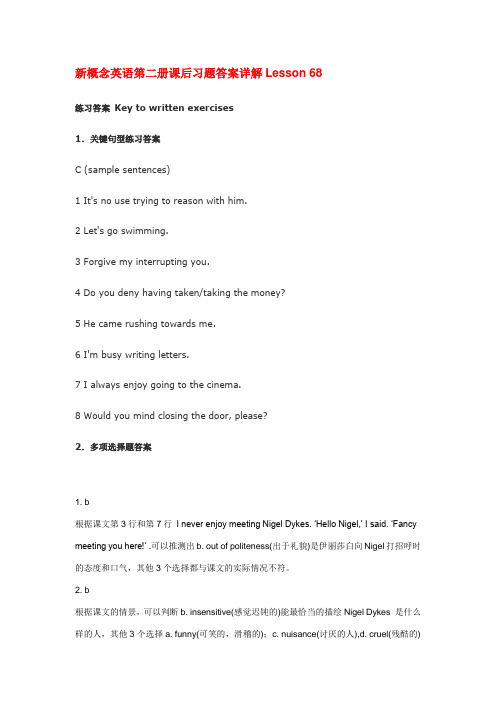
新概念英语第二册课后习题答案详解Lesson 68练习答案Key to written exercises1.关键句型练习答案C (sample sentences)1 It's no use trying to reason with him.2 Let's go swimming.3 Forgive my interrupting you.4 Do you deny having taken/taking the money?5 He came rushing towards me.6 I'm busy writing letters.7 I always enjoy going to the cinema.8 Would you mind closing the door, please?2.多项选择题答案1. b根据课文第3行和第7行I never enjoy meeting Nigel Dykes. ‘Hello Nigel,’ I said. ‘Fancy meeting you here!’ .可以推测出b. out of politeness(出于礼貌)是伊丽莎白向Nigel打招呼时的态度和口气,其他3个选择都与课文的实际情况不符。
2. b根据课文的情景,可以判断b. insensitive(感觉迟钝的)能最恰当的描绘Nigel Dykes 是什么样的人,其他3个选择a. funny(可笑的,滑稽的);c. nuisance(讨厌的人),d. cruel(残酷的)都不够恰当,不符合课文的内容。
我们这道题目是让你选一个词来描绘Nigel Dykes 是什么样的人,只有他反应迟钝能够最恰当了。
他不能领会作者的意思,作者不想跟他说话,便称自己要去看牙医,很明显作者是想打发Nigel Dykes 他走,但是他硬是不明白作者的意思,还要陪作者去。
你说这样的一个人,不时反应迟钝,还是什么用我们现在的话来说“他大脑有问题,积水啦,弱智啦。
新概念英语第二册 L68 persistent

2. 避免
avoid +n./+doing No one can avoid making mistakes while
learning a foreign language.
Avoidable
pretend [pri'tend] v.
1.Could you tell me some words that can express feelings?
like, hate, love, boring, angry, happy, sad, frightened, afraid, upset, nervous……
2.What would you do when you come across 偶遇 someone you don't like?
We might not change others and the environment around that we don't like, but what we can change is our attitude towards them.
1.Ic_r_o_ss_e_d the street to avoid meeting him, but he saw me and came running __to_w_a_r_dsme.
I crossed the street to avoid meeting him, but he saw me and came running towards me. cross v. 穿过 I cross the garden. across adv.&prep. 穿过 I go across the garden.
新概念英语第二册第68课-Persistent
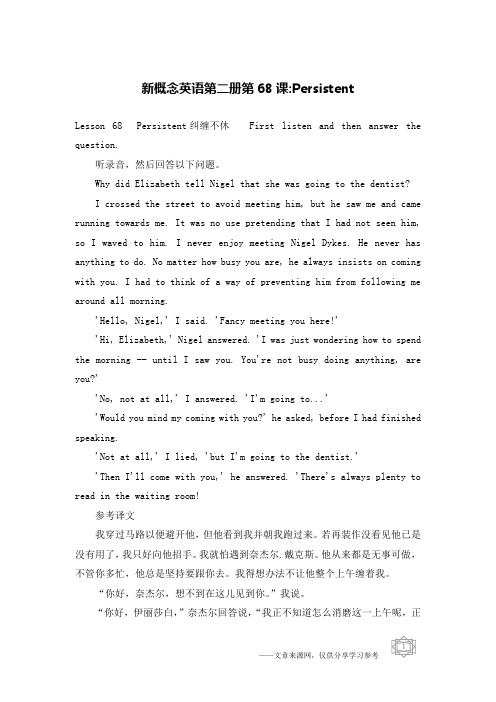
新概念英语第二册第68课:PersistentLesson 68 Persistent纠缠不休First listen and then answer the question.听录音,然后回答以下问题。
Why did Elizabeth tell Nigel that she was going to the dentist?I crossed the street to avoid meeting him, but he saw me and came running towards me. It was no use pretending that I had not seen him, so I waved to him. I never enjoy meeting Nigel Dykes. He never has anything to do. No matter how busy you are, he always insists on coming with you. I had to think of a way of preventing him from following me around all morning.'Hello, Nigel,' I said. 'Fancy meeting you here!''Hi, Elizabeth,' Nigel answered. 'I was just wondering how to spend the morning -- until I saw you. You're not busy doing anything, are you?''No, not at all,' I answered. 'I'm going to...''Would you mind my coming with you?' he asked, before I had finished speaking.'Not at all,' I lied, 'but I'm going to the dentist.''Then I'll come with you,' he answered. 'There's always plenty to read in the waiting room!参考译文我穿过马路以便避开他,但他看到我并朝我跑过来。
新概念2 Lesson 68

'Not at all,' I lied, 'but I'm going to the dentist.' ‘ “没关系, 但我准备去牙医那里. “我说了个 谎.
Then I'll come with you,' he answered. 'There's always plenty to read in the waiting room!’ “那我也跟你去, 候诊室里总有很多东西可供 阅读!”他回答.
insist ① vt. &vi. ~ (on sth) demand (sth) forcefully, not accepting a refusal 坚持或坚决要求(某事物): insist on doing sth.坚持做…… 我弟弟坚持要和我一起去。 My brother insists on going with me. 他坚持会议的重要性。 He insists on the importance of the meeting. ② vt. &vi. ~ on sth/doing sth require or demand (the specified thing), refusing to accept an alternative 坚决主张/要求,一定要 I insist on speaking to the manager. My wife insists that I (should) have my hair cut.
Hello, Nigel,' I said. 'Fancy meeting you here!' 'Hi, Elizabeth,' Nigel answered. “你好, 奈杰尔, 想不到在这儿见到你. “我说. “你好, 伊丽莎白, “奈杰尔回答说。 'Fancy meeting you here!'=Imagine meeting you here!真想不到会在这见到你!(fancy= imagine) “fancy+名词”表示惊讶
新概念英语二68课习题68Persistent 纠缠不休

本课满分100 分,本人得分_______,最高分________,最低分_________L68一.听课文,回答下列问题。
(10’)1.What did Elizabeth try to do when she crossed the street?_____________________________________________________2.Was she able to do so or not?___________________________________3.Does he always insist on accompanying her or not?_________________________________________________4.Where did she tell him she was going?_________________________________________5.Why did he say he would come with her?_________________________________________________二单项选择题。
(20’)1.________ busy my father is, he always goes to the church on Sundays.A.No matter howB.AithoughC.SinceD.No matter what2. Although he was ill, he insists on ________ to school.A.goB.goesC.goinge3. W h at do you _______ this plan? I have on idea.A.think ofB.take ofC.look ofD.see of4._______ the door, he was prevented from fire.A.Thanks asB.Thanking forC.Thanks forD.Thanks to5. After the quarrel, I avoid ________ to him.A.talksB.talkingC.to talkD.talk6. Can I come _______ you to the shop?A.withB.behindC. toD. at7. Before I _______ my word, he interupted me.A.finishedB.finishC.had finishedD.finishing8.This is the best ______ about this uestion.A.problemB.replayC.answerD.result9. There is always plenty to ________ in the library!A.readB.lookC.playD.see10.The answer is in the ______ page. Please check it by yourself!A. followedB.followingC.followD.follows三.翻译下列短语或句子。
新概念2第68课

mind doing sth. 介意做...
• Would you mind opening the window?你介意把窗户打 开吗? →Would you mind my opening the window?你介意我.. • Fancy writing a letter like that!真想不到写了那样一 封信。 →Fancy her writing a letter like that!真想不到她...
eg.I cross the garden. eg.I go across the garden.
避免…… <Note 1>
come running towards sb. 向某人跑过来 <Note 2>
动名词短语作真主语
It was no use pretending that I ( had not seen him , so I waved to ) him .
表能力: can/could(2种时态), be able to(各种时态). 成功地完成过去某个 动作时用was able to 而不用could。
“讲(实话,谎话,秘密等)”。 “辨别,分辨” “说出时间,识钟”
Lesson 68
Persistent
[pə'sistənt]
persistent [pə'sistənt] adj. 坚持/固执的;持续 的,持久的 The persistent rain will do harm to his weak knees. He was a persistent thief.
(完整word版)裕兴新概念英语第二册笔记第68课

Lesson 68 不休PersistentNew words and expressionspersistent avoid insistpersistent1) (人,行 )不屈不 的; 拗的, 固的persistent effortseg.He was persistent in his question. 他素来追 终究。
lasting)persist [ p?'sist ] v.persist in sth/doing ⋯ 持, 意eg.Does he always persist in his opinion like that?eg.She persisted in taking her dog with her.eg.He will persist in riding that dreadful bicycle.eg.He persists in believing that he was right.persistence n.[u. 不能数名 ] 持不懈 , 意 ,持eg.His persistence touches me.avoid v.避开 , 避 ;防范 , 防avoid+n./doingeg.Fortunately,we were able to avoid an accident.eg.The car turned to the left to avoid a collision.eg.He crossed the street to avoid seeing me.eg.Try to avoid driving in rush hours.avoid sb/sth like the plague.全力回避,尽早 开avoidable adj.可防范的v.+able 可 ⋯ 了 ,能 ⋯lovable 可 的washable 耐洗的acceptableunderstandablen.+able ------> adj.comfortable / agreeablemiserable / suitableinsist v. 持做insist on sth/doing持或 决要求(某事物)2)(事物)长远的,不断的( persistent rain persistent pain persistent noise persistent backache v. 持做adj. 持的,固 的 v.避开insist that sb (should) do ⋯eg.I insist on your coming with us.eg.I insist that you (should) go with us.eg.He insisted that I (should) apologize.eg.He insisted on going swimming.insist v.持,信,固的声称eg.She insisted that she was innocent.eg.I insisted that I hadn ’tdone that.insistent adj.持的,不容拒或反的insistence n.[u]insistence on/about sth区insist on/persist instick to/keep oninsist on n./doing持要求,持(要求,看法,主,意)eg.She insisted on her opinion at the meeting.eg.She insisted on going with us.insist + that 从句有两种情况:1)“ 决,” ,从句用述气。
- 1、下载文档前请自行甄别文档内容的完整性,平台不提供额外的编辑、内容补充、找答案等附加服务。
- 2、"仅部分预览"的文档,不可在线预览部分如存在完整性等问题,可反馈申请退款(可完整预览的文档不适用该条件!)。
- 3、如文档侵犯您的权益,请联系客服反馈,我们会尽快为您处理(人工客服工作时间:9:00-18:30)。
新概念英语第二册课后习题答案详解Lesson 68
练习答案 Key to written exercises
1.关键句型练习答案
C (sample sentences)
1 It's no use trying to reason with him.
2 Let's go swimming.
3 Forgive my interrupting you.
4 Do you deny having taken/taking the money?
5 He came rushing towards me.
6 I'm busy writing letters.
7 I always enjoy going to the cinema.
8 Would you mind closing the door, please? 2.多项选择题答案
1. b
根据课文第3行和第7行 I never enjoy meeting Nigel Dykes. ‘Hello Nigel,’ I said. ‘Fancy meeting you here!’ .可以推测出b. out of politeness(出于礼貌)是伊丽莎白向Nigel打招呼时的态度和口气,其他3个选择都与课文的实际情况不符。
2. b
根据课文的情景,可以判断b. insensitive(感觉迟钝的)能最恰当的描绘Nigel Dykes 是什么样的人,其他3个选择a. funny(可笑的,滑稽的);c. nuisance(讨厌的人),d. cruel(残酷的)都不够恰当,不符合课文的内容。
我们这道题目是让你选一个词来描绘Nigel Dykes 是什么样的人,只有他反应迟钝能够最恰当了。
他不能领会作者的意思,作者不想跟他说话,便称自己要去看牙医,很明显作者是想打发Nigel Dykes 他走,但是他硬是不明白作者的意思,还要陪作者去。
你说这样的一个人,不时反应迟钝,还是什么???用我们现在的话来说“他大脑有问题,积水啦,弱智啦。
”
只有c. running 最合乎语法,running 在此句中是现在分词做状语,表示方式。
其他3个选择都不合乎语法。
a. run 是动词原形,不能放在went 后面;
b. to running 前面不应该有to; d. ran 是过去式,更不能用在went 后面,所以选
c.
4. d
该句中的worth (值得……的)是形容词,它后面只能跟名词或动名词。
a. to do, b. do , c. done 都不是动名词,所以都不符合语法;只有d. doing 是动名词,所以选d.
5. b
该句需要选一个同前一句中的never has anything to do (从来无事可做)意义相同的短语。
a. has to do nothing (什么都不必做)同前一句意思不符;c. nothing has to do 和d. to do nothing has 都是语序混乱,没有意义;只有b. has nothing to do (无事可做)同never has anything to do 意义相同,所以选b.
该句的动词insisted(坚持)后面需要跟on+动名词或that引导的从句,其谓语一定要用should加动词原形。
a. to go, c. to going, d. in going 都不符合语法,只有
b. that he should go 可以跟在insist后面做宾语,所以选b.
7. b
该句中的动词mind(介意)后面可以直接跟动名词也
可以在动名词前加宾格或所有格代词,但所表达的意思不同.
a.-若什么也不加,虽然合乎语法,但句子意思有些含糊不清,因为主语she同最后的her不知是否是一个人,如果是一个人,句子前后矛盾,如果是两个人,没有上下文可以证明,故不能选a.
c. he 是主格代词
d. himself是反身代词
3者都不符合语法,只有b. his是所有格代词,既符合语法和题目意思,所以选b.
8. c
该句需要选一个后面能跟动名词做宾语的动词或词组。
a. prevent (阻止)后面不能直接跟动名词,应该是prevent sb. from doing sth.; b. prevent from 不合乎语法,因为prevent 是及物动词后面应该带宾语,即prevent sb. from …; d. escape from (逃避,避免疾病、痛苦、事故等)后面跟名词,但很少接动名词,词意思也不太符合这个句子;只有c. avoid (避开)后面只能跟动名词做宾语,因此选c.
9. c
该句需要一个同前一句中的动词pretend(假装)含义相同的短语。
a. make as if(制作得好像……一样);
b. do as if(做得好像……一样);
d. conduct as if(表现或举止好像……一样);这3个选择都与pretend含义不同。
只有c. act as if(假装像……一样)与pretend的含义相同, act有假装的意思,所以选c.
10. c
前一句中的谓语动词waved to 意思为“向……招手”,本句需要选同这个词含义相同的词。
a. shook (握手,shake 的过去式) 和b. saluted (向……致敬,敬礼);c. greeted (问候,打招呼)和d. called (叫喊,召唤)中,只有c. 同waved to 含义最接近,所以选c.
11. a
前一句Fancy meeting you here ! 是感叹句,意思:想不到在这儿见到你!fancy 是动词,表示“想像”本句需要选一个同这一动词意义相同并且表示“惊讶”的词做感叹句。
b. think (考虑);c. Consider (考虑); d. Contemplate (沉思)3个选择都与Fancy 的含义不符,也不能做感叹词,表示惊讶,所以选a.
12. a
该句需要选一个合适的词,以便进一步解释前一句She lied to him (她向他说谎)。
报只有a. false (假
的)最能说明前一句的“说谎”。
而其他3个选择中:b. true (真实的)与说谎意义相反;c. lie (谎言)是名词,虽然符合题目意思,但是它前面应该有冠词a; d. wrong (错的)词意思不如false 贴切,所以选a.
只有b. By then(那时,此时)可以用于过去完成时,因此b是答案.
7. c
本句的谓语动词looked on 是一般过去时,从句也应该是相应的过去时态。
a. turn, b. to turn 都不合乎语法;d. it was turning 是过去进行时,一般不适合于以before 或者after 引导的状语从句中;只有c. it turned 是一般过去时,最合乎语法,所以应该选c.
8. a
前一句的unaware of 意思是没有意识到,本句需要选出与它意思相反的词组,以使两个句子意思相同.
a. conscious of (意识到,知道的),
b. knowledgeable about(对……有见识的,有知识的),
c. sensitive to(对……敏感的),
d. sensible about(对……觉察的,敏感的)中,只有a. 是unaware of 的反义词,所以选a.
9. c
前一句中的动词grew(变得)是系动词,后面跟形容词做表语,本句需要选一个同grew意义相同的系动词。
a. increased(增加),
b. began(开始),d. behaved(表现)这3个词都不能做系动词,所以都不对。
只有
c. became变得)是系动词,同grew意思相同,所以选c.
10. d
该句需要选出与前一句中的aside (到一边,向旁边)的含义相近的短语。
a. in 与aside 意思相反;b. on 与aside 意思不同,不合乎题目意思;c. this 不是正确的表达方式,意思不通;只有d. 与aside 含义相符,所以选d.
11. d
本句只有选d. felt sorry for 才能同前一句(It looked on sympathetically)的意思最接近。
而a. liked 和b. loved 都不符合题目意思。
c.
sympathised 不合乎语法,应该是sympathised with. 所以选d.
12. c
a. taking care of ,
b. looking after 都是关照的意思,不合题义. d. minding(留心,当心)也不符合题目意思,只有
c. paying attention to(注意)最适合这个句子,所以选c.。
